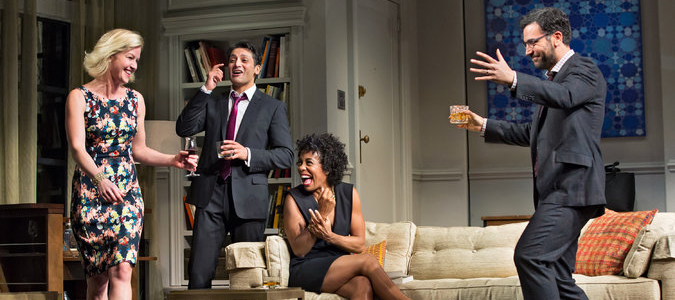

Disgraced
Opening Night: October 23, 2014
Closing: March 1, 2015
Theater: Lyceum Theatre
Disgraced tells the the story of Amir Kapoor, a successful Muslim-American lawyer who is rapidly moving up the corporate ladder while distancing himself from his cultural roots. When Amir and his wife Emily, a white artist influenced by Islamic paintings, host a dinner party, what starts out as a friendly conversation escalates into something far more damaging.
BUY TICKETSREAD THE REVIEWS:
October 23, 2014
“Bon appétit!” The festive phrase announcing the start of a meal sounds more like a bell signaling another round in a prizefight when it is chirped by Gretchen Mol, playing a hostess whose dinner party has become a verbal jousting tournament in Ayad Akhtar’s terrific, turbulent drama Disgraced. By this point in the play, which opened at the Lyceum Theater on Thursday night, the nerves of everyone settling down to eat have been scraped raw. It’s hard to concentrate on your fennel and anchovy salad when the conversation over cocktails has descended into a fierce debate about the rise of Islamic terrorism and the basic tenets or the meaning of the Quran. Mr. Akhtar’s play, which was first seen in New York in 2012 and went on to win the Pulitzer Prize, has come roaring back to life on Broadway in a first-rate production directed by Kimberly Senior that features an almost entirely new cast. In the years since it was first produced here, the play’s exploration of the conflicts between modern culture and Islamic faith, as embodied by the complicated man at its center — a Pakistani-born, thoroughly assimilated New Yorker — have become ever more pertinent. The rise of the so-called Islamic State, and the news that radicalized Muslims from Europe and the United States have joined the conflict raging in Syria and Iraq, brings an even keener edge to Mr. Akhtar’s engrossing drama. At first blush, Amir (Hari Dhillon) seems to be in admirable possession of an American-dream life. He’s a lawyer specializing in mergers and acquisitions, which explains the immaculate apartment with a terrace to make any New Yorker salivate. His wife, Emily (Ms. Mol), is a painter on track to be included in a new show at the Whitney. Emily has begun a portrait of Amir inspired by a Velazquez painting of his Moorish assistant. An incident with a waiter at a restaurant the night before brought Amir’s ethnic heritage to the fore, and Emily has become intrigued by the gap “between what he was assuming about you, and what you really are”: words that will prove eerily prophetic as the drama unfolds.
READ THE REVIEWOctober 23, 2014
As a friend and I left Ayad Akhtar’s Disgraced, which premiered two years ago, nabbed the Pulitzer Prize and recently moved to Broadway, he mused that you don’t see a lot of in-depth “issue” fare in pop culture. Even Homeland’s ripped-from–Al Jazeera realism is a cover for spy-versus-spy melodrama, and the vast majority of movies favor the tentpole over the bully pulpit. I told him issue plays are scarce in theater, too, especially on the Great White Way. Maybe that’s why I liked Disgraced more this time around. In truth, this is a superior production to the one that opened at Lincoln Center in 2012, with a more charismatic cast and a better sense of the rising ideological stakes. In the lead role of proudly assimilated lawyer Amir Kapoor, Hari Dhillon cuts a handsome, graceful figure (different to the simmering suavity of original Amir, Aasif Mandvi). He has an easy chemistry with his pretty wife, Emily (Gretchen Mol), an artist whose recent work is influenced by Islamic ornamentation.
READ THE REVIEWOctober 23, 2014
There are some topics you just shouldn’t discuss at a dinner party. Religion, race, politics — it’s probably good to avoid these controversial matters altogether, and focus on more agreeable subjects. Like the weather. Perhaps if the two couples in Disgraced would have taken that advice, they would have avoided a whole lot of trouble and pain. Then again, if the Pulitzer Prize-winning play by Ayad Akhtar, now open at the Lyceum Theatre, stayed away from such discourse, we wouldn’t have been treated to one of the season’s most engaging nights of theater. At the center of the intense debate sits Amir Kapoor (Hari Dhillon), a Manhattan corporate lawyer on the brink of a partner promotion who has long left his Muslim upbringing behind. Dismissing his religion as “a backward way of thinking and being,” Amir goes as far as telling his firm he’s from India rather than Pakistan so that he’s not associated with any stigma his birth country might have in the modern world today.
READ THE REVIEWOctober 23, 2014
What does Miss Manners say about how to ensure dinner conversations remain polite? Never bring up politics or religion. Thankfully, playwright Ayad Akhtar minds her no heed. Akhtar’s blistering Disgraced opened Thursday on Broadway at the Lyceum Theatre with a punch and power that won it a Pulitzer Prize. Few playwrights are examining what Akhtar does, certainly not with his insightfulness, and his play is breathtaking — and not a little uncomfortable — to watch. In the best of ways. An excellent five-person cast led by Hari Dhillon — and beautifully directed by Kimberly Senior — starts the play with swagger and confidence, building to horrific exchanges in which they are at each other’s throats, and then ushering a fall, much like a Manhattan God of Carnage. The play by the author of American Dervish is similarly exploring the papered-over fault lines raging beneath even the pampered and polished. In this case, he’s looking at Islam, race, cultural appropriation, entitlement and determinism. The playwright sets things up with a few scenes and then lets everything explode at a dinner party in a swanky Upper East Side apartment. Things get heated. There is violence. No wonder the pork tenderloin is uneaten.
READ THE REVIEWOctober 23, 2014
Ayad Akhtar’s topical play Disgraced, the worthy winner of last year’s Pulitzer Prize for drama, continues a long tradition of theater that explores the costs of assimilation for minority groups in the great American melting pot. In this case, we get an engaging snapshot of the challenge for upwardly mobile Muslim Americans in the post-9/11 age. At the show’s center is Amir Kapoor (Hari Dhillon), a Pakistani-American mergers & acquisitions lawyer living on Manhattan’s Upper East Side with his blonde wife, Emily (Boardwalk Empire‘s Gretchen Mol). Amir is a man of complications and contradictions. He’s rejected his Muslim upbringing (and even his surname) to better blend into American society and get ahead at his law firm, but he still feels the occasional tug of his Islamic upbringing—if only to consciously reject it. And his wife, a painter who’s drawn to the rich traditions of Islamic art, nudges Amir to more openly embrace the heritage that serves as her artistic muse. But when she cajoles Amir into attending a hearing for his nephew’s imam, jailed on perhaps trumped-up charges of financing terrorist-supporting groups, the resulting publicity leads to sharp consequences—and his standing at his firm takes a serious nosedive. Akhtar piles on additional conflicts, both domestic and professional, culminating in a fraught dinner party with Emily’s Jewish art dealer, Isaac (How I Met Your Mother alum Josh Radnor), and Isaac’s African American wife, Jory (Karen Pittman), a lawyer in Amir’s firm who’s also vying for partnership. In another great theater tradition, tempers flare and people say things that they probably wish could be un-said.
READ THE REVIEW



















